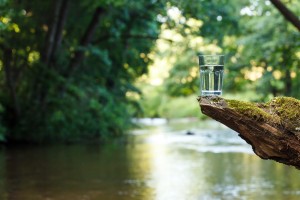Resource Conservation
Reducing the Negative Environmental Impact of our Business Activities
Current and future generations strongly depend on the availability and the state of the planet`s natural resources. However, these resources are threatened by deforestation, overfishing, air and water pollution etc. Hence, we are committed to protect our environment and thus launched our Detox as well as our Green Production Program.
Green Production Program
Striving to minimize our environmental footprint is important for us. The production of consumer goods can produce excessive waste and pollute the environment. Unfortunately, many factories do not have the necessary management systems in place to effectively reduce or prevent such negative effects of their production. Subsequently, we are working on creating awareness and to guide our business partners to better manage their production process in an environmentally friendly manner.
In September 2017, we initiated th e Green Production Program, which is our own environmental performance monitoring system. Following, REWE Group became part of amfori BEPI, which enables companies to improve the environmental performance in their supply chain. Among other initiatives and audit schemes, which we recognize, amfori BEPI will be a central part of our environmental compliance system. Moreover, our first goal, on our green production journey, is to include all our metal and plastic suppliers and their respective factories into our environmental monitoring program by 2020.
e Green Production Program, which is our own environmental performance monitoring system. Following, REWE Group became part of amfori BEPI, which enables companies to improve the environmental performance in their supply chain. Among other initiatives and audit schemes, which we recognize, amfori BEPI will be a central part of our environmental compliance system. Moreover, our first goal, on our green production journey, is to include all our metal and plastic suppliers and their respective factories into our environmental monitoring program by 2020.
Through our Green Production Program, we assist our business partners to identify the biggest environmental impacts of their production, support them to better understand them as well as to identify feasible measures aiming at improving their environmental performance. This covers various relevant hotspots such as water, waste and emission management, pollution prevention, but also Environmental Management Systems, which are crucial to be able to monitor and manage the environmental footprint in a sustainable manner.
Through specific trainings, workshops and hands-on consultancy services, we not only train our suppliers on our respective requirements but also empower our production partners to continuously work towards improving their environmental performance. This does not only provide an ecological benefit for the factories but also an economical one. By improving and modernising their environmental management they can reduce cost and raise efficiency. Moreover, for many suppliers working with amfori BEPI or by attaining an ISO14001 certification is an incentive, as it improves their reputation and attracts like-minded customers aiming to maintain and facilitate supply chain sustainability.
Detox Program
As a responsible organization, we are deeply committed to a more environmentally friendly production of textiles, which is reflected by our Detox Program, which we’ve initiated in 2014 and ultimately by joining the Greenpeace Detox Campaign in order to work towards eliminating hazardous chemicals and ensuring the use of safe chemicals in the whole lifecycle and production process by 2020.
At REWE Far East, we are dedicated to facilitate transparency in our textile supply chain, especially when it comes to the use of hazardous chemicals in the production of textiles. To achieve our ambitious goal, we developed a strategy with defined targets and activities.

Moreover, REWE Far East supports its suppliers and production sites through informational material, events, and trainings to identify toxic chemicals at an early stage and to substitute environmental friendly alternatives. Regular water and product tests ensure that the implemented measures are successful. The entire process is outlined in detail in REWE Group’s Supplier Tool Kit.
Following our philosophy of continuous improvement and capacity building, REWE Group and Tchibo have partnered with the Deutsche Gesellschaft für Internationale Zusammenarbeit (GIZ) GmbH (German development agency) and the German Ministry for Economic Cooperation and Development. The partners set up the program ‘Sustainable Chemical and Environmental Management in the Textile Sector’ designed to eliminate hazardous chemicals from production processes. To reach this goal, the program provides support and training for factories in the supply chains of the initiative’s founding companies. The initial target is to educate employees in all of our main wet-process factories, which are located both in China and Bangladesh. Trainees learn how to control and optimize the use of chemicals during production in order to improve the quality of waste water. They also learn how to use water, energy and other resources more efficiently. The training approach makes a point of qualifying Chinese and Bangladeshi educators to work in the respective factories – rather than sending foreign staff with a translator. These educators or trainers visit the factories to evaluate the current situation and train according to the factory’s specific requirements.
